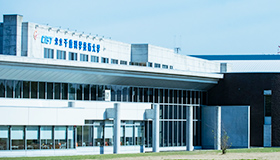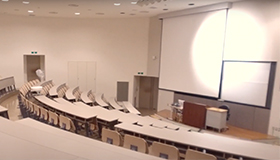Curriculum of the Department of Applied Chemistry and Bioscience
Home - English - University information - Faculty of Science and Technology - Department of Applied Chemistry and Bioscience - Curriculum of the Department of Applied Chemistry and Bioscience
Features of the curriculum
Starting from the acquisition of basic knowledge, students can study many subjects that can be applied to any kind of science and technology field.

Students can study basic chemistry subjects such as organic chemistry and physical chemistry, and basic biology subjects such as biochemistry and molecular biology, and select many applied subjects.
Applied subjects include a wide range of options such as Analytical Chemistry and Polymer Science in the chemistry field, Biomimetics and Medical Materials in the biology and medical fields, and Quantum Mechanics, Laser Engineering and Electromagnetism in the physics and electronics fields.
Most courses are elective subjects, allowing students to study subjects based on their own interests.
The practical training subjects include chemical and biological experiments as well as laser technology, electronic circuit production, computer programming and other themes, allowing students to acquire the skills and abilities to handle any kind of science and technology field.
Applied subjects include a wide range of options such as Analytical Chemistry and Polymer Science in the chemistry field, Biomimetics and Medical Materials in the biology and medical fields, and Quantum Mechanics, Laser Engineering and Electromagnetism in the physics and electronics fields.
Most courses are elective subjects, allowing students to study subjects based on their own interests.
The practical training subjects include chemical and biological experiments as well as laser technology, electronic circuit production, computer programming and other themes, allowing students to acquire the skills and abilities to handle any kind of science and technology field.
Outline of subjects
●Compulsory subject ★Elective compulsory subject ■Elective subject
Second year
Learning goal
To understand the connections between basic fields such as chemistry, biology, and mathematicsApplied chemistry field
■Organic Chemistry ●Analytical Science ●Polymer Science ★Basic Organic Chemistry
Biological and medical engineering field
●Photobiology ■Biochemistry ■Basic Biology A ■Molecular Biology
Common subjects
●Photonics Science Experiments A and B ●Material Science A ●Optics ●Computer Programming 1
■Introduction to Quantum Science ■Systems Engineering ■Introduction to Earth Science 1 and 2 ■Material Science B
■Electromagnetism ■Digital Circuits ■Physics Experiment
■Introduction to Quantum Science ■Systems Engineering ■Introduction to Earth Science 1 and 2 ■Material Science B
■Electromagnetism ■Digital Circuits ■Physics Experiment
Third year
Learning goal
To acquire the ability to find ways of solving problems by applying expertiseApplied chemistry field
■Environmental Chemistry ★Material Photonics Experiments A and B ■Photonics Polymers ■Chemical Engineering ■Chemistry Experiments
■Molecular Design ■Organic Electronics and Photonics ■Inorganic Electronics and Photonics
■Molecular Design ■Organic Electronics and Photonics ■Inorganic Electronics and Photonics
Biological and medical engineering field
★Bioelectronic Photonics Experiments A and B ■Introduction to Medicine ■Biopolymers ■Biological Sample Analysis ■Biophotonics ■Biomimetics
■Medical Laser Engineering ■Bioelectronics ■Biological Experiments ■Medical Inorganic Materials ■Biological Application ■Medical Polymers
■Medical Laser Engineering ■Bioelectronics ■Biological Experiments ■Medical Inorganic Materials ■Biological Application ■Medical Polymers
Common subjects
●Computer Application ■Analog Circuits ■Internship ■Photonics Condensed Matter
■Nanophotonics Device ■Electronics Measurements ■Introduction to Laser
■Nanophotonics Device ■Electronics Measurements ■Introduction to Laser
Fourth year
Learning goal
To set a goal and apply researchApplied chemistry
★Material Photonics Seminar
Biological and medical engineering field
★Biomedical Photonics Seminar
Common subjects
●Journal Club ●Graduation Research A and B
Featured subjects
Optical Science Experiment B (second year)
Students deepen their understanding of the fields that form the basis of applied biochemistry such as physics, electronic engineering, chemistry, and biology, through basic experiments on optical measurements, organic systems, and polymers.
Students not only acquire experimental techniques but also the ability to write a report, which is an important skill for technologists, by repeatedly submitting reports.
Students not only acquire experimental techniques but also the ability to write a report, which is an important skill for technologists, by repeatedly submitting reports.
Material Photonics Experiment B (third year)
Students acquire the ability to devise a creative solution and to develop the logic while conducting well-balanced physical and chemical experiments under the four themes of “opt device” and “optical interferometer” in the physics field, and “azo dye” and “photosensitive resin” in the chemistry field.
Their communication skills are also honed through team experiments.
Their communication skills are also honed through team experiments.
Medical Materials (third year)
Students learn about the properties of metal, ceramic and polymer materials, which are all medical materials (biomaterials) that can be applied to achieve therapy and perform tests in the medical field.
In addition to understanding the mechanism and function of the human body, students also learn about biocompatibility (interaction between living organisms and materials) as related to artificial bone and blood vessels.
In addition to understanding the mechanism and function of the human body, students also learn about biocompatibility (interaction between living organisms and materials) as related to artificial bone and blood vessels.



